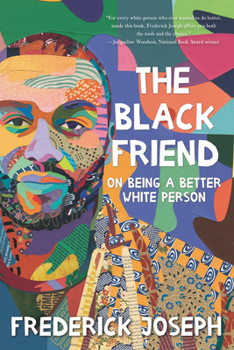The Black Friend: On Being a Better White Person
Select Format
Select Condition 
Book Overview
The instant New York Times bestseller
Writing from the perspective of a friend, Frederick Joseph offers candid reflections on his own experiences with racism and conversations with prominent artists and activists about theirs--creating an essential read for white people who are committed anti-racists and those newly come to the cause of racial justice. "We don't see color." "I didn't know Black people liked Star Wars " "What hood are you from?" For Frederick Joseph, life as a transfer student in a largely white high school was full of wince-worthy moments that he often simply let go. As he grew older, however, he saw these as missed opportunities not only to stand up for himself, but to spread awareness to those white people who didn't see the negative impact they were having. Speaking directly to the reader, The Black Friend calls up race-related anecdotes from the author's past, weaving in his thoughts on why they were hurtful and how he might handle things differently now. Each chapter features the voice of at least one artist or activist, including Angie Thomas, author of The Hate U Give; April Reign, creator of #OscarsSoWhite; Jemele Hill, sports journalist and podcast host; and eleven others. Touching on everything from cultural appropriation to power dynamics, "reverse racism" to white privilege, microaggressions to the tragic results of overt racism, this book serves as conversation starter, tool kit, and invaluable window into the life of a former "token Black kid" who now presents himself as the friend many readers need. Backmatter includes an encyclopedia of racism, providing details on relevant historical events, terminology, and more.
Writing from the perspective of a friend, Frederick Joseph offers candid reflections on his own experiences with racism and conversations with prominent artists and activists about theirs--creating an essential read for white people who are committed anti-racists and those newly come to the cause of racial justice. "We don't see color." "I didn't know Black people liked Star Wars " "What hood are you from?" For Frederick Joseph, life as a transfer student in a largely white high school was full of wince-worthy moments that he often simply let go. As he grew older, however, he saw these as missed opportunities not only to stand up for himself, but to spread awareness to those white people who didn't see the negative impact they were having. Speaking directly to the reader, The Black Friend calls up race-related anecdotes from the author's past, weaving in his thoughts on why they were hurtful and how he might handle things differently now. Each chapter features the voice of at least one artist or activist, including Angie Thomas, author of The Hate U Give; April Reign, creator of #OscarsSoWhite; Jemele Hill, sports journalist and podcast host; and eleven others. Touching on everything from cultural appropriation to power dynamics, "reverse racism" to white privilege, microaggressions to the tragic results of overt racism, this book serves as conversation starter, tool kit, and invaluable window into the life of a former "token Black kid" who now presents himself as the friend many readers need. Backmatter includes an encyclopedia of racism, providing details on relevant historical events, terminology, and more.
Format:Hardcover
Language:English
ISBN:1536217018
ISBN13:9781536217018
Release Date:December 2020
Publisher:Candlewick Press (MA)
Length:272 Pages
Weight:0.96 lbs.
Dimensions:1.1" x 5.5" x 8.3"
Age Range:12 years and up
Grade Range:Grade 7 and higher
Customer Reviews
1 rating
A Must Read for all White People
Published by Toni , 1 year ago
Fredrick Joseph is humorous, kind, and pulls no punches in this beautiful book all about how to be a better white friend.
Joseph shares personal experiences, trusting us, the readers, to not only hear but to listen.
My favorite chapters were “Certain Things Are Racist, Even if You Don’t Know It”, “So Your Friend Is Racist. What Should You Do?”, and, “In the End: We Don’t Need Allies; We Need Accomplices.”
I learned things I shouldn’t be doing: like wearing box braids. (Yeah kinda embarrassed that I didn’t know this was cultural appropriation). Things I should be doing: not just asking if a person is okay after a racist comment was directed to them, but saying something in the moment to the racist person. I also learned that affirmative action is actually used by a majority of poor white people and white women, and that it isn’t the handout I was taught it was.
Fredrick (can I call him that?! I feel like a friend now!) also includes an Encyclopedia of Racism in the back of the book that includes terms such as “cultural appropriation”, “Intersection”, “Tulsa Race Massacre” and “Xenophobia”.
Throughout the book he also tells us which movies and playlists and artists and people we should know about and how society has failed us if we don’t know them. For the record I didn’t know most of movies or music and only half of the books!
Fredrick Joseph also interviews many different marginalized people: activists, media personalities, actors, authors, professors etc. The addition of these voices gave different perspectives but often proved the points made in this book.
I am a slow reader but finished this book in just a few sittings. Joseph is engaging, concise and beautifully sincere. I do not take his effort and candidness for granted. This book is a gift to us white people. He wasn’t obligated to relive his trauma just to teach us what it means to be a Black person in America and how we white people can be better people.
Everyone would benefit from this book. White people need to read this book.






